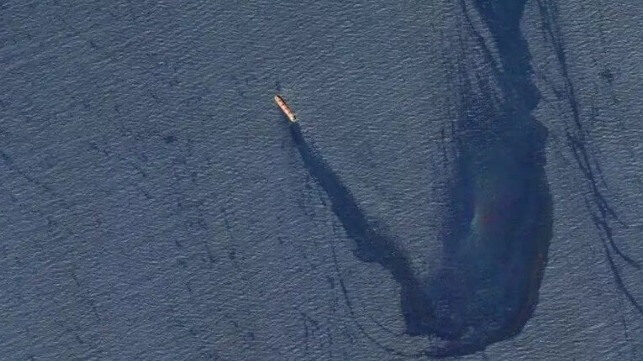Rubymar Defies Houthis, Leaking Oil and Taking on Water, But Still Afloat

Five days after the Houthis' most damaging attack yet on a merchant ship, the bulk carrier Rubymar continues to defy the odds and is hanging on anchored in a narrow portion of the Bab el-Mandeb. The defiant little ship, which reports several times alleged had sunk, is leaking oil and taking on water, but still there confirmed by a U.S. Central Command photo. In the latest move in the ongoing conflict, CENTCOM is using that attack on her and a relief ship to “demonstrate disregard for the region,” by the militant group.
Late on Friday, CENTCOM released an aerial image showing the Rubymar and the massive oil slick forming behind the 32,200 dwt bulker registered in Belize. The report says it has caused a massive oil slick and CENTCOM worries that its cargo of fertilizer could also leak into the Red Sea adding to the environmental consequences for the region from the Houthis’ actions. Earlier in the week, BBC published the first confirmed photos of the vessel sitting low at the stern but afloat.
“The unprovoked and reckless attack by Iran-backed Houthi terrorists caused significant damage to the ship, which caused an 18-mile oil slick. The M/V Rubymar was transporting over 41,000 tons of fertilizer when it was attacked, which could spill into the Red Sea and worsen this environmental disaster,” CENTCOM writes captioning the photo.
Update to Feb. 18 Houthi attack on commercial shipping
— U.S. Central Command (@CENTCOM) February 23, 2024
On Feb. 18 between 9:30 p.m. and 10:40 p.m., Iran-backed Houthi terrorists attacked the M/V Rubymar, a Belize-flagged, UK-owned bulk carrier. The ship is anchored but slowly taking on water. The unprovoked and reckless… pic.twitter.com/LoXO7DaV5i
The vessel’s operator confirmed these details in an interview earlier in the day with The New York Times. The missile strike on February 18 hit the vessel in the stern with the operator telling NYT the engine room and one of the holds is underwater. While the ship is reported to still be taking on water, so far it is stable at anchor. They reported they still hope to tow it to either Djibouti or Aden, Yemen, according to The New York Times, which says the plan is to transfer the fertilizer cargo to another vessel that will complete the trip to Bulgaria.
The crew of the Rubymar was rescued by another merchant vessel. The New York Times reports there were 11 Syrians, six Egyptians, three Indians, and four Filipinos in the crew. They were uninjured and the paper says they have been flown home.
The attack on the Rubymar was followed by an attack the following day, February 19, on the Sea Champion (48,850 dwt), a Greek-flagged, U.S.-owned bulk carrier inbound for the port of Aden, Yemen from Argentina. CENTCOM reports a missile detonated near the ship causing minor damage. The ship arrived in Yemen the following day with experts questioning if it was mistakenly targeted. Houthi social media spokesperson Yahya Saree however said it was targeted because of its American ownership.

that matters most
Get the latest maritime news delivered to your inbox daily.
In the propaganda war, CENTCOM however points out the humanitarian nature of the ship’s mission noting the Sea Champion had delivered humanitarian aid to Yemen 11 times in the past five years. She was loaded with corn for the people of Yemen on this trip.
During the week, the Houthis vowed to escalate their attacks until the siege of Gaza ends. U.S. and coalition forces stepped up their efforts taking down multiple missiles and drones while the U.S. continued to target weapons ready for launch. The EU also authorized its defensive mission for the region.
